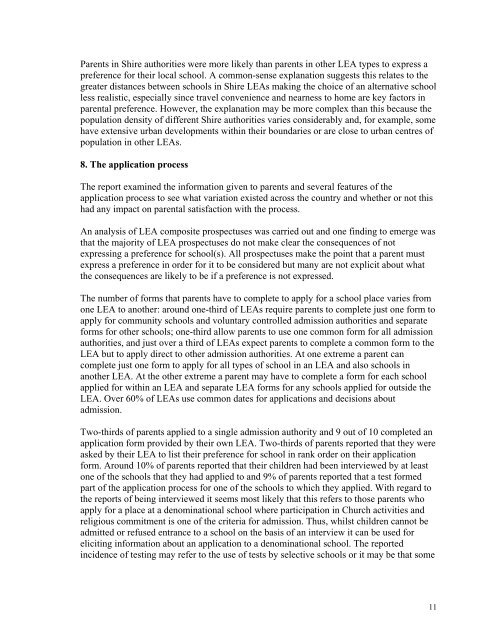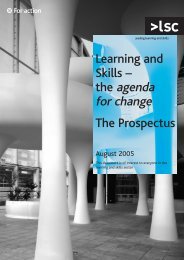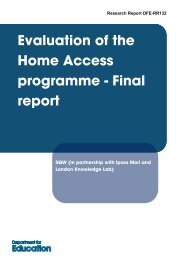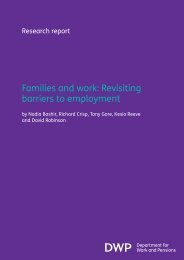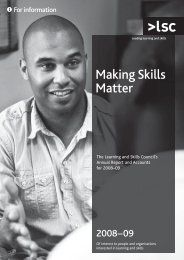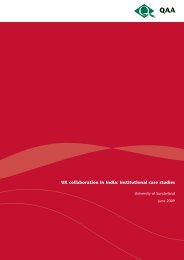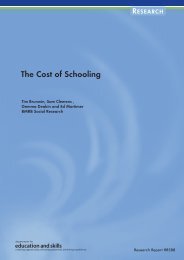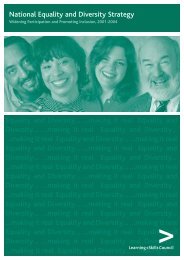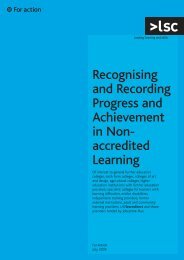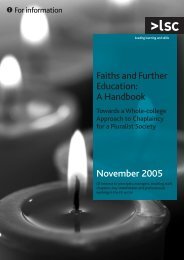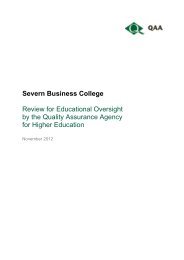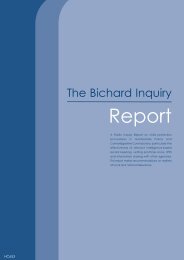Parents' Experiences of the Process of Choosing a Secondary School
Parents' Experiences of the Process of Choosing a Secondary School
Parents' Experiences of the Process of Choosing a Secondary School
You also want an ePaper? Increase the reach of your titles
YUMPU automatically turns print PDFs into web optimized ePapers that Google loves.
Parents in Shire authorities were more likely than parents in o<strong>the</strong>r LEA types to express a<br />
preference for <strong>the</strong>ir local school. A common-sense explanation suggests this relates to <strong>the</strong><br />
greater distances between schools in Shire LEAs making <strong>the</strong> choice <strong>of</strong> an alternative school<br />
less realistic, especially since travel convenience and nearness to home are key factors in<br />
parental preference. However, <strong>the</strong> explanation may be more complex than this because <strong>the</strong><br />
population density <strong>of</strong> different Shire authorities varies considerably and, for example, some<br />
have extensive urban developments within <strong>the</strong>ir boundaries or are close to urban centres <strong>of</strong><br />
population in o<strong>the</strong>r LEAs.<br />
8. The application process<br />
The report examined <strong>the</strong> information given to parents and several features <strong>of</strong> <strong>the</strong><br />
application process to see what variation existed across <strong>the</strong> country and whe<strong>the</strong>r or not this<br />
had any impact on parental satisfaction with <strong>the</strong> process.<br />
An analysis <strong>of</strong> LEA composite prospectuses was carried out and one finding to emerge was<br />
that <strong>the</strong> majority <strong>of</strong> LEA prospectuses do not make clear <strong>the</strong> consequences <strong>of</strong> not<br />
expressing a preference for school(s). All prospectuses make <strong>the</strong> point that a parent must<br />
express a preference in order for it to be considered but many are not explicit about what<br />
<strong>the</strong> consequences are likely to be if a preference is not expressed.<br />
The number <strong>of</strong> forms that parents have to complete to apply for a school place varies from<br />
one LEA to ano<strong>the</strong>r: around one-third <strong>of</strong> LEAs require parents to complete just one form to<br />
apply for community schools and voluntary controlled admission authorities and separate<br />
forms for o<strong>the</strong>r schools; one-third allow parents to use one common form for all admission<br />
authorities, and just over a third <strong>of</strong> LEAs expect parents to complete a common form to <strong>the</strong><br />
LEA but to apply direct to o<strong>the</strong>r admission authorities. At one extreme a parent can<br />
complete just one form to apply for all types <strong>of</strong> school in an LEA and also schools in<br />
ano<strong>the</strong>r LEA. At <strong>the</strong> o<strong>the</strong>r extreme a parent may have to complete a form for each school<br />
applied for within an LEA and separate LEA forms for any schools applied for outside <strong>the</strong><br />
LEA. Over 60% <strong>of</strong> LEAs use common dates for applications and decisions about<br />
admission.<br />
Two-thirds <strong>of</strong> parents applied to a single admission authority and 9 out <strong>of</strong> 10 completed an<br />
application form provided by <strong>the</strong>ir own LEA. Two-thirds <strong>of</strong> parents reported that <strong>the</strong>y were<br />
asked by <strong>the</strong>ir LEA to list <strong>the</strong>ir preference for school in rank order on <strong>the</strong>ir application<br />
form. Around 10% <strong>of</strong> parents reported that <strong>the</strong>ir children had been interviewed by at least<br />
one <strong>of</strong> <strong>the</strong> schools that <strong>the</strong>y had applied to and 9% <strong>of</strong> parents reported that a test formed<br />
part <strong>of</strong> <strong>the</strong> application process for one <strong>of</strong> <strong>the</strong> schools to which <strong>the</strong>y applied. With regard to<br />
<strong>the</strong> reports <strong>of</strong> being interviewed it seems most likely that this refers to those parents who<br />
apply for a place at a denominational school where participation in Church activities and<br />
religious commitment is one <strong>of</strong> <strong>the</strong> criteria for admission. Thus, whilst children cannot be<br />
admitted or refused entrance to a school on <strong>the</strong> basis <strong>of</strong> an interview it can be used for<br />
eliciting information about an application to a denominational school. The reported<br />
incidence <strong>of</strong> testing may refer to <strong>the</strong> use <strong>of</strong> tests by selective schools or it may be that some<br />
11


